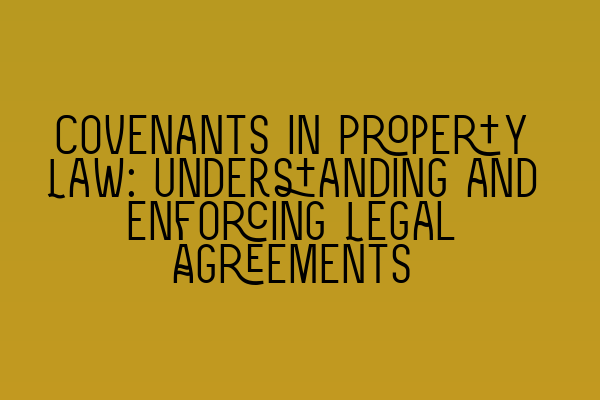Covenants in Property Law: Understanding and Enforcing Legal Agreements
When it comes to property law, covenants play a vital role in defining and enforcing legal agreements between parties. Whether you are a property owner, tenant, or landlord, understanding covenants is essential to ensure your rights and obligations are protected. In this article, we will delve into the intricacies of covenants in property law, their types, how they are enforced, and the implications they may have on different parties.
Firstly, let us define what a covenant is in the context of property law. A covenant is a legally binding agreement between parties that outlines their rights and obligations concerning the use, management, or restriction of a property. These agreements are commonly found in various property-related documents, including leases, sales contracts, and deeds.
Types of Covenants
There are two main types of covenants: positive covenants and restrictive covenants. Positive covenants require a party to actively do something, such as maintaining the property or paying fees. On the other hand, restrictive covenants prohibit certain actions or restrict the use of the property. Let’s explore these types further:
1. Positive Covenants
Positive covenants are obligations that require a party to perform specific actions related to the property. These can include maintaining the property in good condition, paying service charges, or contributing to community facilities. Positive covenants are commonly found in leases and can benefit both tenants and landlords by ensuring a well-maintained property.
2. Restrictive Covenants
Restrictive covenants, as the name suggests, impose restrictions on the use or development of a property. They are used to maintain the character and quality of an area and protect the interests of the parties involved. Examples of restrictive covenants may include limitations on building height, restrictions on commercial use, or preventing certain activities on the property. Restrictive covenants are often found in property deeds or neighborhood agreements.
Enforcing Covenants
Enforcing covenants is crucial to uphold the agreements made between parties. If one party fails to fulfill their obligations, the other party may seek legal remedies to ensure compliance. However, the enforceability of covenants can vary depending on their nature and the legal framework surrounding them. Here are some key factors to consider when enforcing covenants:
- Type of Covenant: The enforceability of a covenant depends on whether it is positive or restrictive. Courts tend to be more lenient in enforcing positive covenants compared to restrictive covenants.
- Privity of Contract: The privity of contract refers to the relationship between the original parties involved in the covenant. Generally, a covenant can only be enforced by those who were parties to the original agreement. However, there are exceptions to this rule, such as when the benefit of a covenant runs with the land.
- Registration: Registering a covenant can enhance its enforceability. By registering a covenant, it becomes binding on future owners of the property, ensuring continuous compliance.
It is essential to consult with a property law solicitor to understand the specific regulations and requirements regarding the enforcement of covenants in your jurisdiction.
Implications of Covenants
Covenants can have significant implications on various parties involved in property transactions. Here are some key considerations:
- Tenant-Landlord Relationships: Covenants in lease agreements maintain the rights and obligations of both tenants and landlords. They ensure that the property is well-maintained, service charges are paid, and both parties are protected throughout the tenancy.
- Property Developers and Owners: Restrictive covenants can impact property developers and owners by limiting their use or development plans. It is important for developers and owners to carefully review existing covenants before commencing any construction or renovation work.
- Neighborhood Agreements: Restrictive covenants can be used to maintain the quality and character of a neighborhood. Homeowners associations and neighborhood agreements often include covenants to preserve property values and ensure a harmonious living environment.
As property law continues to evolve, it is essential to stay updated on key changes and implications. Make sure to check out our related article on Updates in UK Property Laws: Key Changes and Implications to stay informed.
In addition, if you’re facing legal challenges in your property transactions, our comprehensive guide on Legal challenges in property transactions: A comprehensive guide can provide you with valuable insights and solutions.
For tenants and landlords seeking clarity on lease laws in the UK, we highly recommend reading our article on Navigating Lease Laws in the UK: Essential Guidelines for Tenants and Landlords. It covers essential guidelines to help you navigate the complexities of lease agreements.
Lastly, if you want to avoid common pitfalls in property law and ensure success in your exams or professional practice, our article on Dominate Property Law Questions: Avoiding Common Pitfalls provides valuable tips and strategies to help you ace your property law assessments.
In conclusion, covenants play a crucial role in property law, providing a framework for defining rights and obligations. Understanding the different types of covenants, how they are enforced, and their implications is vital for all parties involved in property transactions. If you require legal advice or guidance regarding covenants or any other property law matter, do not hesitate to reach out to our team at SQE Property Law & Land Law.
